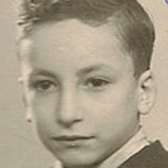
Marcel Hodak was born August 25, 1937, in Paris, France. His father, Jules, and mother, Feiga, were both born in the Russian Empire. They met in Constantinople where their families had fled because of the violence of the 1903-1905 pogroms in Kishinev (then in the Russian Empire, today Chișinău, Moldova). In Constantinople, Jules and Feiga married and Feiga gave birth to their oldest child, a daughter named Esther. The family then immigrated to Paris. In Paris, they had three sons, Jean, Achilles, and Marcel. Marcel was the youngest by almost a decade. Jules worked as a presser in the women’s garment industry and Feiga was a seamstress.
Things began to change for Marcel and his family after the Nazi Germany invaded France in May 1940. After the French defeat in June 1940, France signed an armistice with the Germans. The country was initially divided into two main zones: the German-occupied northern zone and the free/unoccupied southern zone. A new French government, led by Marshal Philippe Pétain, known as the Vichy regime, claimed legal authority over all of France. In addition to antisemitic policies imposed by the Germans, the Vichy government instituted its own antisemitic laws and regulations.
In July 1940, the Vichy government instituted a new citizenship and denaturalization policy. The Vichy regime’s goal was to revoke French citizenship from certain recent immigrants, especially Jews, who had been granted citizenship since August 1927. Marcel’s parents and siblings, who had all acquired French citizenship in this time frame, lost their citizenship. Marcel was considered a French citizen from birth. Since they were no longer citizens of France, Marcel’s family was at additional risk for deportation.
In summer 1942, the Germans began to order systematic deportations of Jews from France to killing centers in occupied eastern Europe. To protect his family, Jules decided the family should move south to a town called Brides-les-Bains, where they had spent summer vacations. Brides-les-Bains is a resort town at the foot of the Alps, near the border between France and Italy. Jules found work as a lumberjack and Feiga used her sewing skills to earn income to buy necessities.
Marcel’s older brother, Jean, joined a French resistance group called the Maquis. The group fought against German occupation troops in the Alps and occasionally brought back rations that had been parachuted in from England. On these occasions, the Maquis was greeted with fanfare and Marcel was allowed to carry Jean’s rifle. It was too heavy for young Marcel to hold, but he dragged it proudly by its shoulder strap.
Marcel’s family tried to blend in as much as possible with the people of Brides-les-Bains, and on Sundays Marcel was sent to the town’s Catholic church. He often forgot to remove his beret, and as he sat in the pews the priest would come down the aisle, remove Marcel’s hat, and place it on his lap. Years later Marcel found out that the priest was actually a member of the resistance .
While Marcel’s immediate family was living in Brides-les-Bains, his extended family also decided to flee Paris, scattering in all directions. His uncle, Ucher Perelstein, and his uncle’s wife were the only two who were arrested. They were picked up in a German raid and sent to Auschwitz in March 1944. Neither survived.
The liberation of France began with the Allied troops landing at Normandy on June 6, 1944. In summer 1944, after Brides-les-Bains was liberated, Marcel and his family returned to Paris. Paris was liberated on August 25, 1944, Marcel’s seventh birthday. A few days later, Marcel watched from his father’s shoulders as a victory parade went down the Champs Elysées, accompanied by thousands of freedom fighters.
Marcel and his brothers left France for America shortly after liberation and settled in Brooklyn, New York. Their parents followed several years later. Marcel served in the US Air Force from 1956 until 1967 and later became a software specialist. He married in 1958, and he and his wife had three sons. Marcel was a volunteer at the United States Holocaust Memorial Museum.
